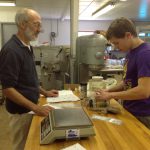
In June 2012, I sat down with Constantine to discuss a potential job opportunity. He was looking for someone to help tell the story of his company. We talked for hours that day, over several cups of Dawn Chorus Coffee. He asked if I thought in two weeks, I could write the whole story of Athens’ Own. I said of course! Two weeks, that’s plenty of time to write about a business. Why would I have thought that with all my organizational, educational, and personal experiences, it wouldn’t be a breeze?
Almost an entire year later, here I am, with still only the beginnings of the story in my head. I am not saying that I slacked off for a year, I am saying that I never imagined the complexity of the Athens’ Own story could be more than a “This is who we are, this is what we do”. It has taken me almost a year to realize that not only did I not know anything then, I only know bits and pieces now.
That is not to say that I haven’t learned that much in a year. In fact, the exact opposite is true. I have learned an incredible amount of information. I have learned stories and stories about people, places, foods, visions, dreams, and ideas. I have learned new concepts and new skills. I have learned a bit about how to run a business, and a bit more about how to embrace my community. But if I had to pick the main lesson out from this past year, it would be the lesson of how to learn.
I still don’t think I was naive in assuming I could write the story of a business in two weeks. I’m sure there are plenty of businesses out there who can easily sum up who they are and what they do in a few fairly simple paragraphs. However, in the case of Athens’ Own, I found that the story is as much about my own journey as it is Constantine’s. Had I arrived at that first day and said there was no way I could ever learn it all in two weeks, I might have reached this conclusion sooner. In fact, looking back, what I should have said was: “I HOPE I can’t learn the story in two weeks. If I could, it can’t be that impressive of a story.”
In each day that followed, I have observed, participated, helped, asked questions, heard stories, looked things up, wrote bits and pieces, and learned a bit more. Perhaps the most challenging part of this experience was that for each bit I learned, ten more bits emerged that I didn’t yet understand. For a person like me who likes things quantified, I have been exasperated more than once with the seemingly endlessness of the journey. However, I have continually held onto the driving and motivating hope that one day I can somehow get it all down in a way that someone else can read. Each piece that I construct brings me a sense of satisfaction that one more piece of the puzzle is in place, even if that puzzle keeps getting bigger every day.
But the point I would like to make from all this is that the old proverb that “It’s not the destination, it’s the journey” is the truest statement I could ever make about my time at Athens’ Own. Although I originally thought my learning experience would have a definitive end and I would move from the learner to the teacher, I have discovered that there is no clear destination, and that is indeed the entire point. I am here to learn, and to continue learning. Even more importantly, I am here to seek out the knowledge and experience, in order to make this challenging journey last as long as possible, beyond Athens’ Own, beyond a job, and beyond anything I can imagine. I have learned, simply, that I have a lot to learn.
-Alyse

